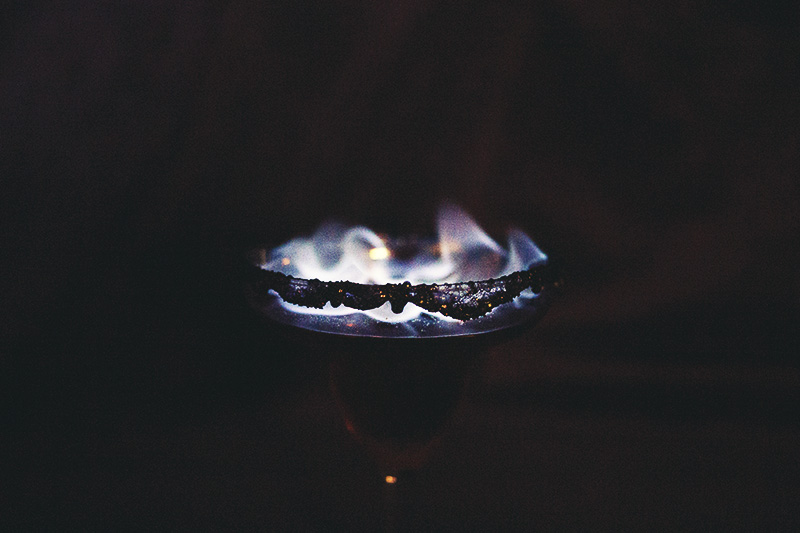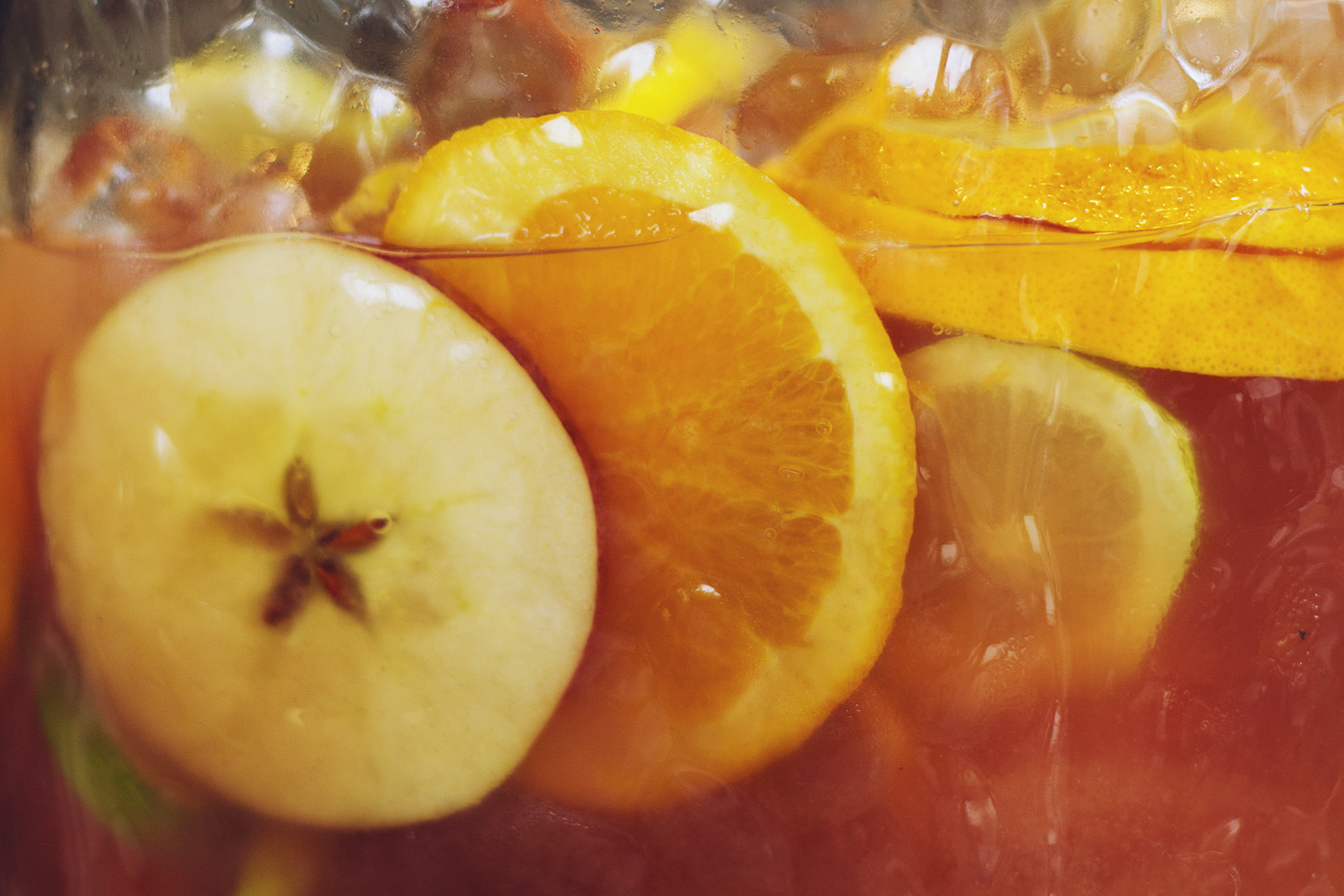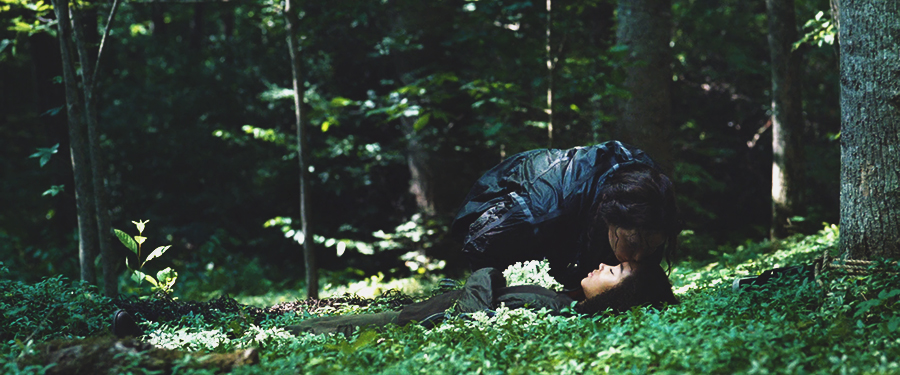
The Place Where I Love You
Katniss holds Prim, encircling her little sister in the safety of her arms, and sings. Of a meadow. Of a better world where Prim can be safe and loved. The meadow, to Katniss, is beyond life; no place in their reality could offer such peace. Yet, years later, she somehow finds that meadow. Both in herself, and in the real world that surrounds her. Grown upon years of death and suffering, both Katniss and her home find life, even when she may have preferred death.
The epilogue of both the films and the novels is bittersweet, but it is filled with a kind of hope. There may never be a free happiness to be found for either Katniss or Peeta, who have suffered so much, but there’s something else for them: comfort, safety, the knowledge neither they nor their children will have to face those horrors again. They find a kind of peace.
One of the few times we, as an audience, see Katniss openly happy is near the beginning of the first film as she hunts with Gale. Perhaps it’s one of the last times in her life she feels that easy joy, not haunted by the blood on her hands. It’s this time, too, that she states to Gale that she’s never having kids. It’s his argument that he might, if he didn’t live in the districts that hints at a large part of Katniss’ motivation: the reaping.
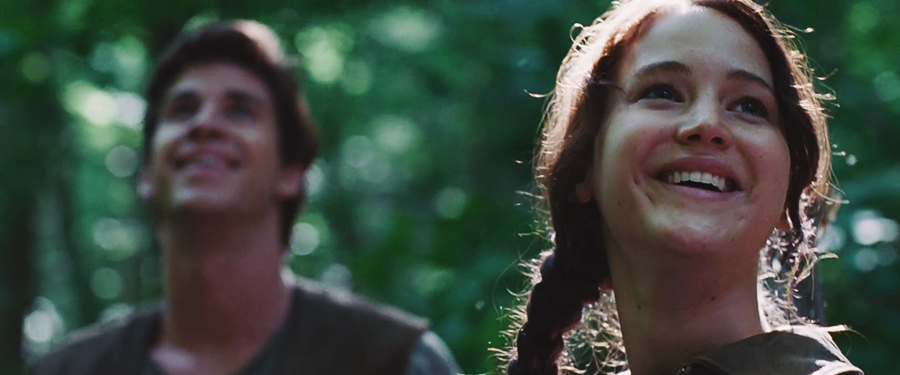
Reaping day is one of utter terror for children. A day of hopelessness and guilt for their parents. The reaping hangs over any person with a family in the districts, any happy moment of bearing a child overshadowed by the knowledge that they could one day be torn away by a simple lottery. The odds can’t be in everyone’s favour.
Katniss, having already lost her father, can’t bear to lose anyone else in her small circle of support. Her fear is so strong that she volunteers for Prim at the reaping without a second thought—a choice so rare she moves her entire, subdued district to say a true farewell to her with their three-fingered salute. She would rather die herself than be alone without the people she loves.
Her experience with motherhood has been through watching the way her mother falls apart when her father is killed in a mining accident. Witnessing her mother’s lifeless depression at such a young age must have had an effect on her ideas of being a mother. When her own mother fails her, she is forced to step into the parental role in her family. Prim is her sister, but she also becomes Katniss’ core responsibility when neither of them can rely on anyone else.
Already, she knows the responsibility of being a caregiver. She experiences the horror of watching her little sister slowly grow to twelve years old, the age that she may be reaped. At least, at her sister’s reaping, she has the power to act. She can volunteer, as she does. As a parent, like her mother, she would become totally useless, unable to do anything to change her child’s fate but watch.
To Katniss, motherhood may seem the hardest sacrifice of all. As Rodney M. Deavault notes in The Masks of Femininity: Perceptions of the Feminine in The Hunger Games and Podkayne of Mars, Katniss has a very bleak view of motherhood. “Since children from the districts are sent to the Capitol for televised slaughter, she views motherhood as the ultimate form of powerlessness.” She is a girl whose life has been defined by her struggle to find the power to protect—to lose that strength is an unallowable thought.
But throughout the trilogy, because of her willingness to sacrifice and rebel for the children she finds herself loving, she eventually helps to overthrow the Capitol so that the citizens of Panem can build a new world. A world where children are born with a future not shadowed by fear and death, and a parent can watch their child play without the knowledge that they may soon lose them. Katniss sparks this rebellion, and through it she finds a hope that she never could have imagined at sixteen.
She does, after all, constantly show her affinity for motherhood—or parenthood in general. Not just with Prim, but with her fellow tribute, Rue, who she allies herself with and ends up unable to save. She babies Peeta in the way she tries to protect him from harsh realities, finds herself taking care of Haymitch even when she is disgusted by him, acts strong for the sake of her Capitol prep team when she is the one bound for death. She has always nurtured and protected despite her cold and isolating exterior, a persona she takes up for the sake of surviving the cruelties of District 12 and the Games.
She shows this, in part, with her music. Singing is associated with her father, and a happier, warmer childhood that still has him in it. She also uses singing throughout the series as a vocal rebellion as well as comfort for those around her. Deep in the Meadow she sings for Prim at the beginning of the first film, when her sister is unable to sleep. She sings it again for Rue, when her friend is dying in her arms. These songs are her voice, deeply personal to her because of their link to her father and the part of her she tried to bury. It’s why they work so well for the rebellion, because it’s what comes from her heart that inspires the people of the districts.
She sings Deep in the Meadow again, in the epilogue of Mockingjay. In the films, this song bookmarks the cinematic series. It tells of a hope for a better place.
In the end, she finds that place.
But it’s not a happy ending. Prim also finds the meadow, but in the same way Rue does: through death. Perhaps the place they’ve moved on to is a warmer, safer place than the meadow Katniss eventually finds herself singing to her children in. She doesn’t know, because she is forced to continue living without her sister.
“Katniss never gets to sacrifice herself,” notes Young Adult author Jennifer Lynn Barnes in her essay, Team Katniss. “She doesn’t get the heroic death. She survives—and that leaves her doing the hardest thing in the world: living in it once so many of the ones that she loves are gone.” Katniss’ greatest fear was always exactly this, and it’s what comes to pass. And yet, there’s a strange hope in this—even after she must live on without Prim, she finds a way to grow back into herself and begin to heal.
She has always been driven by the need to protect, and I feel that in a sense, having children may give her that, and help her heal in having these young people to heal for. But it speaks of something more. Tammy L. Gant writes in her essay, Hungering for Righteousness, that “Sending life into the unknowable future is a supreme act of faith in the potential for humanity to transcend its violent instincts and nurture its spiritual essence.” Katniss shows this faith, free from the terror of her children being torn away.
Through witnessing the acts of kindness so many have performed even during such awful times, Katniss finds a faith in humanity that she once never possessed. I’ve noted in A Dandelion in Spring that kindness is a powerful thing in Katniss’ eyes, and her ability to eventually believe that it could be the norm and not the exception speaks for how much she starts to heal not just from the war, but from her childhood, too.
Even in this meadow, years after the war has ended and she and Peeta have begun to find a sense of calm, she has not lost her voice. Her power, as it was as the figurehead of the rebellion, is in shaping the narrative of Panem. During the Games and the rebellion, she would do this through song, speaking from her heart, and District 13’s propaganda shorts. Now, years later, she does this through song once more—but also through her plans to explain everything that has happened to her children, so that they understand the graves the meadow has grown upon.
Katniss has not lost her voice. She may not be the girl on fire anymore, not constantly prepared to fight or flee, but that’s because that’s never what she wanted. Hunting may still be something she loves—and I doubt she’s given that up—but leading a rebellion? That was never her goal. She was coerced into the role of the Mockingjay, sculpted to fit the part by Haymitch and Cinna, when all she wanted was to live safely and securely with her family and friends. Her goal was for her family to live without the threat of the Capitol. To threaten the Capitol meant putting their lives at risk.
Even though she is without Prim, Katniss escapes the fear of the Capitol. With her children, she does as her father did. She sings, she loves, she tells stories. When they’re older, she’ll likely teach them to hunt. Not just for survival, as she once had to, but because that’s one of the ways she bonded with her own father. That’s where she met her best friend, Gale. But hunting isn’t the only thing she gained from her father. The music within her already shows in her daughter, who she refers to as the “dancing girl.”
Though I personally love the epilogue, I also have mixed feelings on it. Katniss’ sexuality can be interpreted in various ways, and I’m personally fond of seeing her as asexual and/or aromantic, as many other fans do. The epilogue also has similar issues to the Harry Potter epilogue, in that it fulfills the ideals of an older generation rather than that of the young adults the books are aimed at, namely heteronormative marriage and children.
For some, the epilogue is a jarring change from how they read and identified with Katniss. These feelings are completely valid, and I in no way want to imply otherwise. This is just a personal interpretation, because finding the light in Katniss’ epilogue is to find light in my own future.
Many people who’ve experienced trauma, who suffer from depression and PTSD and other neurological disorders, won’t ever find the happy ending that others who haven’t suffered the same might. The ending found in the epilogue isn’t that of Bella’s, from Twilight, or any of the number of Disney Princesses.
But it’s not a sad ending. Katniss’ epilogue may seem sad to those who haven’t had to survive through their worst nightmare, but its happiness is found in the knowledge that even Katniss learns to heal. Even Katniss, who suffers more than many of us can imagine, finds her own version of the meadow from her song.
After a lifetime of rejecting the risk of losing her children to a cruel world, “Katniss embraces hope with a song.” (Gant)
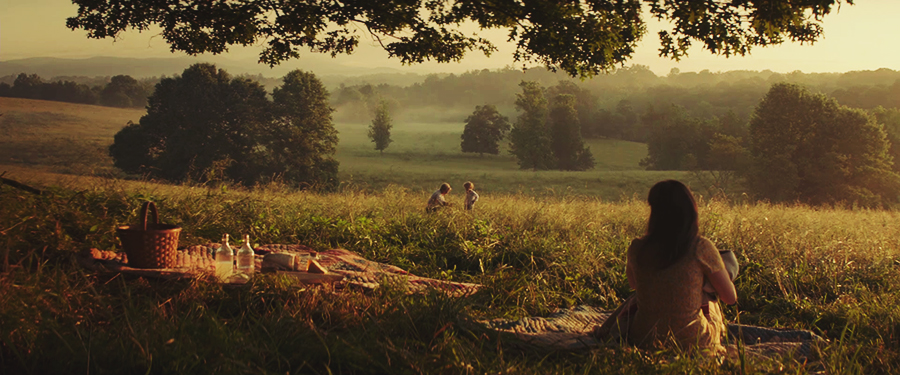
Like my words? You can support me on Patreon!
